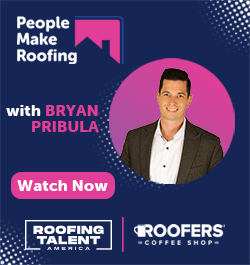Low-slope labor study sheds light on a sticky situation

By: Abby Feinstein, Commercial Roofing Product Manager, CertainTeed Roofing
CertainTeed conducted a comprehensive comparative five-year study of low-slope roofing installations.
As CertainTeed’s commercial roofing product manager, I’m responsible for analyzing and converting market trends into product features, ensuring our product line supports industry stakeholder needs from architect to roofing distributor to roofing contractor to property owner. It’s difficult to find a trade publication these days that doesn’t touch on the ongoing labor shortage. As a manufacturer, CertainTeed has primarily addressed this challenge by offering products that require less skill and install in less time.
Since the 1970’s low-slope modified bitumen roofing applications have utilized hot asphalt or cold asphalt adhesive applied with mops/squeegees, or torch-applied products. Approximately 20 years ago, CertainTeed and other membrane manufacturers introduced low-slope products with factory-applied adhesive. These self-adhered products were marketed to deliver a faster, safer, less-smelly alternative for multi-layer roofing methods. Rather than heating 450°F asphalt in large kettles and spreading it out carefully in layers, self-adhered roofing rolls out and attaches to a roof surface much like a large, incredibly strong, water-tight sticker.
When I took the product manager position I found myself asking, “Just how fast is self-adhered roofing and what proof do we have that it gives commercial roofers an advantage? And where does this product stand when compared to single-ply labor efficiencies?” Anecdotally, our salesforce confirmed our marketing claims but I felt we owed it to the consumer to have the figures and data to back up those claims.
My quest for that knowledge led CertainTeed to embark on a five-year, comparative study of various low-slope product installations, including both multi-layer bituminous and single-ply products, to determine if self-adhered modified bitumen roofing truly delivers cost and labor savings. To execute the study, CertainTeed commissioned Trinity | ERD, a respected national roofing and waterproofing consulting firm, to observe the installation of 45 different low-slope roofs, with six different roof covers in 18 configurations in locations across the United States.
The comprehensive study confirmed that a two-ply self-adhered modified bitumen roof system can be installed with less time than other multi-layer modified systems as well as single-ply products. It also revealed that more goes into constructing a profitable, quality low-slope roof than just the roof cover being installed. Product selection, roof design/project parameters, the tools used and crew management all play a role.
We went into the study aiming to identify the fastest installed low-slope roofing product. Ultimately, we came back with data that is more useful to commercial roofing contractors in that it can help them understand all the factors impacting their work product and profit. The data can help crews optimize labor by product and task, produce more accurate job estimates and more effectively manage crews/projects.
To accurately observe labor efficiencies across different roof coverings, Trinity | ERD took significant effort to minimize labor-impacting variables (i.e. crews with similar experience were observed in similar climates). When outliers such as broken tools or unmanaged/unorganized crews were observed, the related delays were recorded separately. Finally, task-level data—such as the time required to flash a drain with various roof covers/configurations—was applied to a single sample project to produce an ‘apples-to-apples’ comparison.
Observations based on the study include:
- A bituminous roof cover with a mechanically attached base and self-adhered cap is faster to install than the same base sheet covered with either a torch-applied or hot-mopped cap sheet or a single layer of either TPO or PVC.
- Tools matter. For example, a multi-torch cart or “dragon wagon” can cut the field application time of a torch-applied project significantly when used properly.
- On bituminous roof covers, self-adhered field application can offer labor savings, even if the flashing and penetration details are completed with a torch or mop.
- Badly managed crews, faulty tools and extreme climates will increase installation times.
With fewer people entering the roofing trades, commercial roofers face the challenge of delivering quality low-slope roof systems with fewer skilled hands. It’s more important than ever for roofing contractors to use every tool at their disposal to increase labor efficiencies. This low-slope labor study can help roofing contractors drive more profit with their existing crews. My hope is that commercial roofers will utilize this study to get the most out of their teams and the materials they use.
To see the CertainTeed low-slope labor study, visit www.certainteed.com/laborstudy.

















-2025-xtv-mls-tour-2.png)




Comments
Leave a Reply
Have an account? Login to leave a comment!
Sign In